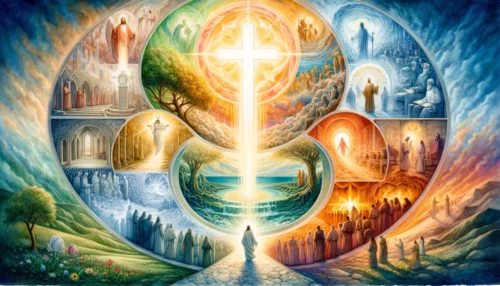In our exploration of the afterlife and its implications for our faith, we come across diverse interpretations and beliefs. One such concept, deeply entrenched in certain Christian traditions, is purgatory – a place or state of temporary suffering for the purification of souls. But is this doctrine of purgatory grounded in the Bible, or is it a theological construct developed over centuries?
Understanding the Concept of Purgatory
Purgatory represents an intermediate state after physical death where some souls undergo purification before entering heaven. The belief in this intermediate state hinges on the idea that, while God is merciful, He is also just, and every sin must be atoned for in some way.
The word ‘purgatory’ derives from the Latin ‘purgare’, meaning ‘to cleanse’ or ‘to purify’. While not a physical place in the traditional sense, purgatory is often depicted as a realm distinct from both heaven and hell, where souls undergo a period of cleansing and rectification. The length of this process is subject to differing beliefs, ranging from an instant to many years, depending on the state of the soul at the moment of death.
Purgatory is primarily a belief upheld within the Roman Catholic Church. According to this doctrine, souls in purgatory are certain of their salvation, yet they must endure this purgation to achieve the holiness necessary to enter heaven. Once purified, they are then admitted into heaven, joining in eternal communion with God.
Purgatory also includes the concept of intercession, a belief that the living can pray for the souls in purgatory to hasten their purification process. This is grounded in the understanding of a mystical bond or ‘communion of saints’ that unites all believers, both living and deceased. This intercessory prayer tradition often intensifies during All Souls’ Day, a day dedicated to prayer for all the faithful departed.
At its core, the doctrine of purgatory is about grace and transformation. It articulates a hope that even after death, unfinished processes of growth and healing might continue until every soul is fit for the vision of God, reflecting the perfect love that casts out fear.
The concept of purgatory then, as understood within some Christian traditions, is a process of purification for souls, not a final destination. It’s an intermediate state where sins are cleansed through atonement, where souls are prepared for the vision of God in heaven. It emphasizes a divine balance of justice and mercy, the atonement of sins, and the unity of all believers. It’s a place of hope, transformation, and preparation for the ultimate communion with God.
Biblical Interpretations and References to Purgatory
A critical note to make is that the term ‘purgatory’ is not explicitly mentioned in the Bible. Still, various scriptural passages have been interpreted as indirect references to a purgatorial process.
Some biblical interpretations supporting the idea of purgatory come from the Old and New Testaments. In the book of Maccabees, an account is given of Judas Maccabeus making atonement for the dead, an action that wouldn’t make sense unless some sort of purification after death was possible (2 Maccabees 12:39-45). This verse, however, comes from the Deuterocanonical books, which are recognized by the Roman Catholic and Orthodox Churches but not by most Protestant denominations.
The New Testament also contains passages that, according to some interpretations, allude to the existence of purgatory. For instance, in the First Letter of Paul to the Corinthians, there’s a metaphor of our works being tested by fire (1 Corinthians 3:13-15). This has been interpreted as an indication of a refining process after death, akin to the cleansing process of purgatory.
Certain passages in the Gospel of Matthew have been viewed as relevant as well, such as Christ’s teaching that anyone who speaks against the Holy Spirit won’t be forgiven, either in this age or in the age to come (Matthew 12:32). Some have interpreted this as implying a possibility of forgiveness or purification after death.
In interpreting these passages, many factors come into play, such as context, translation, and theological perspective. Different Christian denominations have varying views on the existence of purgatory due to these complex interpretations and theological stances.
The Bible doesn’t explicitly mention purgatory. Yet, various passages from both Old and New Testaments have been interpreted as indirect references to the concept. However, interpretation of these passages can greatly vary based on context, translation, and individual theological perspectives, leading to diverse views on purgatory among different Christian denominations.
Evaluating Purgatory in Light of Protestant Christian Doctrine
Protestant Christianity, distinct from Catholicism and Orthodoxy, generally rejects the notion of purgatory, adhering instead to the principle of ‘sola scriptura’ or ‘scripture alone.’ This principle asserts that the Bible, as the Word of God, is the highest authority and the ultimate source of Christian doctrine.
When it comes to the afterlife, many Protestant denominations believe in a binary understanding – heaven for the redeemed and hell for the unredeemed, with no intermediate state. They emphasize the sufficient, complete, and effective work of Christ on the cross, asserting that His sacrifice absolves believers of all their sins. Belief in Christ’s redemptive work, they argue, grants believers direct entry into heaven after death (Ephesians 2:8-9).
Protestants frequently reference the criminal who was crucified next to Jesus and promised paradise on that very day (Luke 23:43). This promise is often interpreted to mean that no further purification is required once one has placed faith in Christ.
Another key element of Protestant theology is the belief in the priesthood of all believers (1 Peter 2:9), which suggests all believers have direct access to God. This belief negates the need for an intermediate state or purgatorial purification, as it underscores the immediacy of the believer’s relationship with God through faith in Christ.
In terms of scriptural interpretations, Protestants reject the apocryphal books including 2 Maccabees, which is often cited in support of purgatory. Likewise, other New Testament passages that are sometimes associated with purgatory, such as those in 1 Corinthians and Matthew, are interpreted differently within Protestant traditions, typically focusing on judgment and rewards rather than purgatorial purification.
Protestant Christianity, operating on the principle of ‘sola scriptura,’ dismisses the concept of purgatory. Emphasizing the sufficiency of Christ’s sacrifice, the priesthood of all believers, and a binary understanding of the afterlife, Protestant doctrine doesn’t affirm an intermediate state of purification. Scriptural passages sometimes associated with purgatory are understood differently within these traditions, centering on themes of judgment, reward, and the immediacy of the believer’s communion with God through faith in Christ.
Fidelity to the Word: The Core of Protestant Christianity
As we delve into the theological constructs and implications around the doctrine of purgatory, the emphasis in Protestant Christianity on the ‘sola scriptura’ principle comes to the fore. The belief that Scripture alone is authoritative for the faith and practice of the Christian has shaped Protestant interpretations of the afterlife, most of which do not include the concept of purgatory.
Here are a few thoughts for your personal reflection:
- How does the ‘sola scriptura’ principle influence your understanding of doctrines such as purgatory?
- How does the Protestant emphasis on the immediate entry into heaven after death resonate with your faith journey?
- What role does the idea of Christ’s complete and effective work on the cross play in your understanding of salvation and the afterlife?
In the end, the diverse doctrines and interpretations within Christianity only reinforce the richness and complexity of our faith. May your exploration of these doctrines deepen your faith and lead you to a greater understanding of God’s word. As you continue to grow in your faith, remember the transformative power of God’s Word and the beauty of Christ’s redemptive work. It is in Him that we have salvation and the promise of eternal life.














